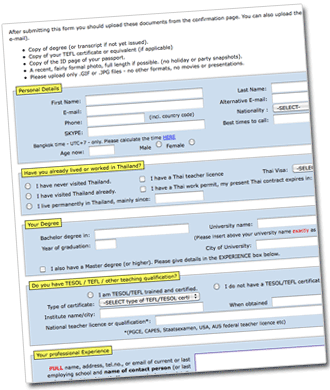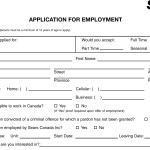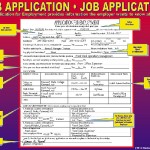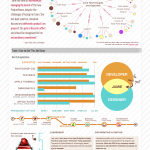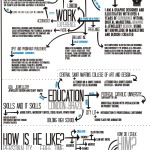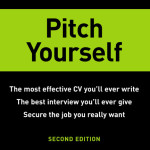Not the relationship meat market this time, but job-hunting – though in many ways it’s a very similar process, one in which one party makes him/herself look and sound more attractive in the hope of being wooed, but often faces an interrogation in the process about various aspects of their life, experience and skills with the prize of a relationship (occasionally long-term, usually medium and often short!)
Where do you actually find jobs in this market? It might be newspapers, but just as Internet dating now seems the most common place of finding a partner, so it is with jobs. Personally, I always preferred to obtain client work through networking via a huge range of contacts and associates, though that is increasingly difficult these days. On some occasions I’ve had to deal with the devil and use interim agencies of one sort or another.
In my case, I am careful not to deal with the so-called “body shoppers” and instead form moderately close business relationships with people you know and trust, those who don’t do a simple word search on your CV but will get to know you personally and to understand your preferences and skills. The alternative of a targeted mail drop to people in organisations you have researched does not often pay dividends, any more than cold calls or junk mail through your front door makes you go out and buy, but there are people who claim to have found work this way.
Nevertheless, the most common form of interface is a job advert of one sort or another, which in public service organisations is carefully regulated. Reading the subtext of these ads often tells you far more than what they actually tell you about the role – how desperate they are to find a suitable candidate, to begin with.
A quick mention here that some employers still insist on their own application forms being completed in preference to CVs, which prevents some of the more esoteric CV designs (see pictures above), and does enable forms to be more comparable. For the applicant they are a total pain in the arse, but there is often no choice. Tant pis!
If however the first sight of you is your CV, tarting it up should be your starting point. You may have numerous versions, depending on which facet of your experience and personality you wish to put to the fore, though hopefully you will never falsify your past! This is apparently very common and a sackable offence, if it is ever found out, though it surely must cover many shades of grey.
The value of invective means you can embroider your CV to look more impressive without actually lying – just stretching the truth a little. It’s quite probable that very many people do that to some degree, though in an interview context it probably becomes quite evident quite soon if someone knows that of which they speak, thanks to the wonders of body language and eye contact. Granted there will be a few accomplished liars who get away with it, but they will know that immediate dismissal would follow if ever it came to light that they had fabricated a past.
There is nothing whatever untrue on my CVs (since by definition I need lots of them to focus on difference skill sets for different roles), though like everybody I am selective in which bits of the past 20 years I’ve highlighted, not to deceive since I will happily talk about anything and everything I’ve done, but because you can’t describe everything within the context of a document 2-4 pages long.
Yes, I know conventional wisdom says 2 pages max but that is not necessarily the case – horses for courses, and in some cases a detailed case study or two is essential to draw out the essentials, rather than a very potted summary. Clearly there are many employers who do adhere to the headlines and making an instant impression, though in my line of work drilling down to greater detail can save a lot of time and effort in the longer term. The trick is to know where and when a more detailed document to accompany your concise CV will earn you extra brownie points.
How you actually compile your CV is another fascinating black science. Download templates and they all look very similar, though there are many companies offering “professionally written” CVs at prices starting at about £100 and rising steeply. What do these offer that you can’t do yourself? Having seen a few (a friend runs a CV-writing company), I’d have said not much other than a dispassionate eye, but unless you really don’t know how to write a CV, what to put in and leave out, and how to present yourself, they don’t necessarily offer any huge benefit.
Of course the florid language and boasts used in some CVs (and the Apprentice provides many examples of how not to write CVs) – see here for lots more howlers! Not that there isn’t good advice out there, such as this:
1. Keep it concise
If you’ve held a number of very senior roles, it’s likely that a one page bio or resume overviewing your career and current role will be more appropriate than a CV. A senior level CV shouldn’t be any longer than three sides of A4. Don’t fall into the trap of adding to it as your career progresses but make sure it’s regularly reviewed for relevance and if appropriate tailored to the specific role you’re applying for.
2. Focus on your current role
Make sure the responsibilities and tangible achievements of your current role constitute at least half, if not all, of the first page.
3. Don’t leave gaps
Compress your early career where possible but without leaving any gaps, which can leave unanswered questions.
4. Sell yourself up front
Don’t blindly conform to format. If you have a brilliant academic background – a first class Oxbridge degree, for example – position it up front, not on the last page.
5. Don’t include your age
Legally you don’t need to put your date of birth or date your education. However, in some cases it’s worthwhile if showcasing that you’re particularly young to be managing director, for example.
6. Leave out your early education
Only refer to degree and post degree qualifications. It’s surprising how many senior level CVs still feature O’ level results or ‘school prefect’! Certainly include an MBA or relevant professional qualification but avoid listing every executive or management course you’ve attended.
7. Personal summary statements aren’t essential
It’s become quite a common feature of CVs but if it’s just a repetition of what comes after, leave it out. However, if you’re applying for a job outside your experience profile, this can be the right place to explain the motivations behind your change of direction.
8. Keep hobbies and interests brief
Do include them but not at length unless they’re relevant to your job. Stay neutral and avoid adding personal details such as the names of your family or even your pets! Don’t be tempted to highlight your passion for ‘medieval sword fighting’ because you love it. Others may not share your views.
9. Don’t include your home address
The only contact details you need on your CV are your mobile number and home email address. This is particularly important if you’re applying for a role located some distance from your home. Unless you state that you’re prepared to re-locate, you may risk being relegated regardless of whether you fit the role.
10. Don’t put referees
Never attach written references or include the names of referees. These will be followed up if you get to interview stage.
However, the best strategic advice on how to present yourself in the best light that I know of is a book called Pitch Yourself! by Bill and Michael Faust. I met Bill Faust at Henley on one occasion. He did a seminar on the techniques mentioned in his book, which focus on competencies – essentially a combination of skills, aptitudes, learning and experience in order to optimise your performance at any key aspect of a job role – ahead of career history to enable you to articulate more precisely the significant value you can add to the organisation, from which your profile should reflect your capabilities and personality – the cream on top that actually makes you stand out from your equally-qualified competitors.
The point is that you could have all the qualifications in the world or have worked for every major player, but unless you can provide material examples (plural) of how you put that knowledge and expertise into good effect when it was required, you cannot demonstrate value. A similar technique involving ten steps to a successful elevator pitch is described here:
10 Steps to Pitch Yourself and Elevate Your Career
Imagine this scenario: You’re in a lift. The doors open and someone walks in. You glance at the newcomer and – it’s Dato’ Lim Kok Wing! Dato’ Tony Fernandes! Bill Gates! (Insert the name of a CEO you’ve always wanted to work for!) This is the opportunity of a lifetime, and you’ve got one elevator ride – just 30 seconds or even less – to introduce yourself and impress Dato’ Lim, Dato’ Tony or Bill enough to hire you.
Unlikely, you say? Think again! Throughout your career, you will be presented with many chances to quickly impress someone who could change your life. Whether these opportunities happen at networking events, at conferences, or even in an elevator, make sure you’ve prepared with an “elevator pitch.”
“Elevator pitch” is a term coined by venture capitalists to describe a brief but concise sales pitch to get an investor to fund a new product or service (30 seconds is the average length of an elevator ride in an average building). As a jobseeker, an elevator pitch is like a TV commercial for yourself – it sums up why you’re awesome and the employer should hire you.
The key point of your elevator pitch is not to ask the person to do something for you – it’s to tell that person what you can do for him or her.
Prep Your Pitch
A good elevator pitch should sound impromptu, but you’ll need to prepare it in advance to get it that way. If you’re stuck on how to condense your 10-year career into 30 seconds, or on how to stretch your lack of work experience, keep in mind the following six questions that your elevator pitch must answer:
- Who are you?
- What do you do?
- What can you do for me?
- Why should I hire you?
- How can I contact you?
1) Write Down Your Accomplishments
Start by writing down your top five work or academic accomplishments. If you don’t have much work experience or are still studying, start with your highest educational qualification or most recent job, and state what your career goal is.
2) Describe Them
Describe each accomplishment. State what the situation was, what you did, and the results.
3) Narrow Down
Narrow down each accomplishment to a single statement. Use action verbs like I achieved…, I led…, I created…, I developed…
4) Analyze That
Analyse what you’ve written. Do your top accomplishments reflect a theme or specialty? Are you all about growth, customer focus, sales excellence, product innovation, etc.? Take those statements that share the same theme, and again, combine them into a single statement.
5) Highlight Yourself
Pick the statement that says the most about you and what you want to be, and make it the highlight of your pitch, right after your introduction. Don’t use industry jargon, as chances are the person you’re talking to may not be familiar with your field. If you confuse them, you won’t impress them.
6) Closing Pitch
Close out your pitch with a clear request for a time to follow up.
7) Read Out Loud
Read your pitch out loud in a natural tone of voice and speed (don’t rush!) and time yourself to make sure it is under 30 seconds. Edit out unnecessary words if you have to, read again, and revise again until it sounds right.
8) Practise, Practise, Practise
Rehearse so that you don’t sound like you rehearsed. Practise saying your elevator pitch out loud, first to yourself. When you’re comfortable with it, practise it on family and friends, and ask them for feedback on the content and your performance.
9) Master Your Key Points
Focus on mastering the key points of your elevator pitch, rather than memorizing a fixed script. That way, it’s easier to customize it to suit the situation and the person you’re talking to, and you’ll sound more natural too.
10) Deliver with Confidence
Deliver your pitch in a confident manner. Look the other person in the eye, smile (but don’t grin), and offer a firm handshake – always be the first to do so to demonstrate your initiative.
Conclusion
Nowadays, it’s not enough to just hand over your business card or your resume – you need to accompany it with a short and professional, but memorable, self-introduction. Take the upcoming JobsDB Career Fair for example – with over a hundred exhibitor booths and thousands of visitors expected, you’ll have only a very short time to make a positive impression on recruiters so that when they review the hundreds of resumes they’ve received, yours will stand out.
Your elevator pitch can also double as your “Tell me a little about yourself” answer during a job interview. If you are looking for a job, repeating your elevator pitch to yourself at the start of every day can be a quick but encouraging reminder of why you are the best at what you do. And one fine day, when Dato’ Lim, Dato’ Tony or Bill walks into your elevator, you’ll be confident and prepared!
Another issue is surely the references we select, whenever we are asked for them. Nobody will select a referee who is going to give them a bad reference, but neither is a good reference guaranteed, particularly if the referee in question wants to keep the candidate. Conversely, if they are happy to see an employee go then they may well give a glowing reference and be thankful someone has taken away from them the responsibility of manoeuvring an exit for them. As a freelancer, my problem is not providing references but keeping track of the referees, since so many of them move between employers at such a startling rate that any email address or phone number may quickly become redundant.
Interviews are a topic worthy of a blog on their own, though in the interests of economy I will keep this brief. First impressions count, they sure do. The appearance, lack of body odour, and the firm handshake make for a positive view before you’ve said a word, yet it’s amazing how many seem incapable of such obvious expressions of professionalism. Not only that, but you worry about people with numerous piercings and tattoos, though these are apparently acceptable in a number of professions these days – though probably not the circles in which I move, hence my lack of personal adornments.
Quite apart from being on the receiving end on many occasions I’ve interviewed plenty of people for plenty of jobs, and in so doing I’ve seen many people who had clearly not read the job description or thought through or prepared any view about their relevance to the role. Some of the most capable candidates on paper turn out to be gibbering wrecks in person, either through nerves or lack of emotional intelligence, the sort of empathy that allows you to relate with another person and communicate effectively precisely what is meant. Bear in mind that you are going to have to work with these people hereafter, if you get the role, so being able to behave like a human being is a pretty good head start!
it helps to put yourself in the position of the interviewer and to identify what is going to make their life easier. For example, nothing is worse than having to rephrase your question so the interviewee understands precisely what you’re getting at, and while a further question to clarify does no harm, rambling at great length without answering the question does. As with any aspect of life, a little thought and preparation helps rather than hinders, but the tendency is to panic and say anything that sounds approximately true rather than thinking through what you are being asked and what will help your cause most.
Perhaps the biggest problem most British people have in interviews and with the whole jobs meat market is blowing our own respective trumpets. We have as a nation an alarming tendency towards modesty, even when what we did was directly successful.
Modesty has its place, but the approach I’ve evolved after years of having to sell myself is realism: I’m not afraid to explain where I have been responsible for a success in business, but neither am I afraid to explain where things went wrong. I know my limitations, and will only claim to be able to do what I have proven through hard graft. What I never do is claim something I can’t do, since ultimately that will not help me or the employer. Being honest does not putting yourself down or not striving to get the job, but it does mean demonstrating integrity and identifying the ways in which you can best serve, which is what the whole process is about.
At any rate, the wheel rolls on and every so often the whole process starts again. It would be nice if we didn’t have to do it, but the marketplace is really the only form of trading open to us – unless we choose to run our own business or work for the family firm. In my case, it’s most unlikely after 20 years of being freelance I would ever be employed by anybody else ever again, since the view is that if I’ve spent that long working for myself I would soon skip off again as soon as the opportunity presented itself. Not necessarily the case, but perceptions of disloyalty are the quickest way to end a professional relationship, just as with personal relationships.
But do remember: even if you are offered the job, think carefully. Is this really what you want? Is it in the right location? Are the salary and benefits what you need and want? Is there a better alternative? Will the role be a thankless task you will want to leave after 6 months? You selecting the right employer is every bit as important as them selecting you, so don’t be afraid to ask them challenging questions at interview.
Oh, and may the force be with you!


